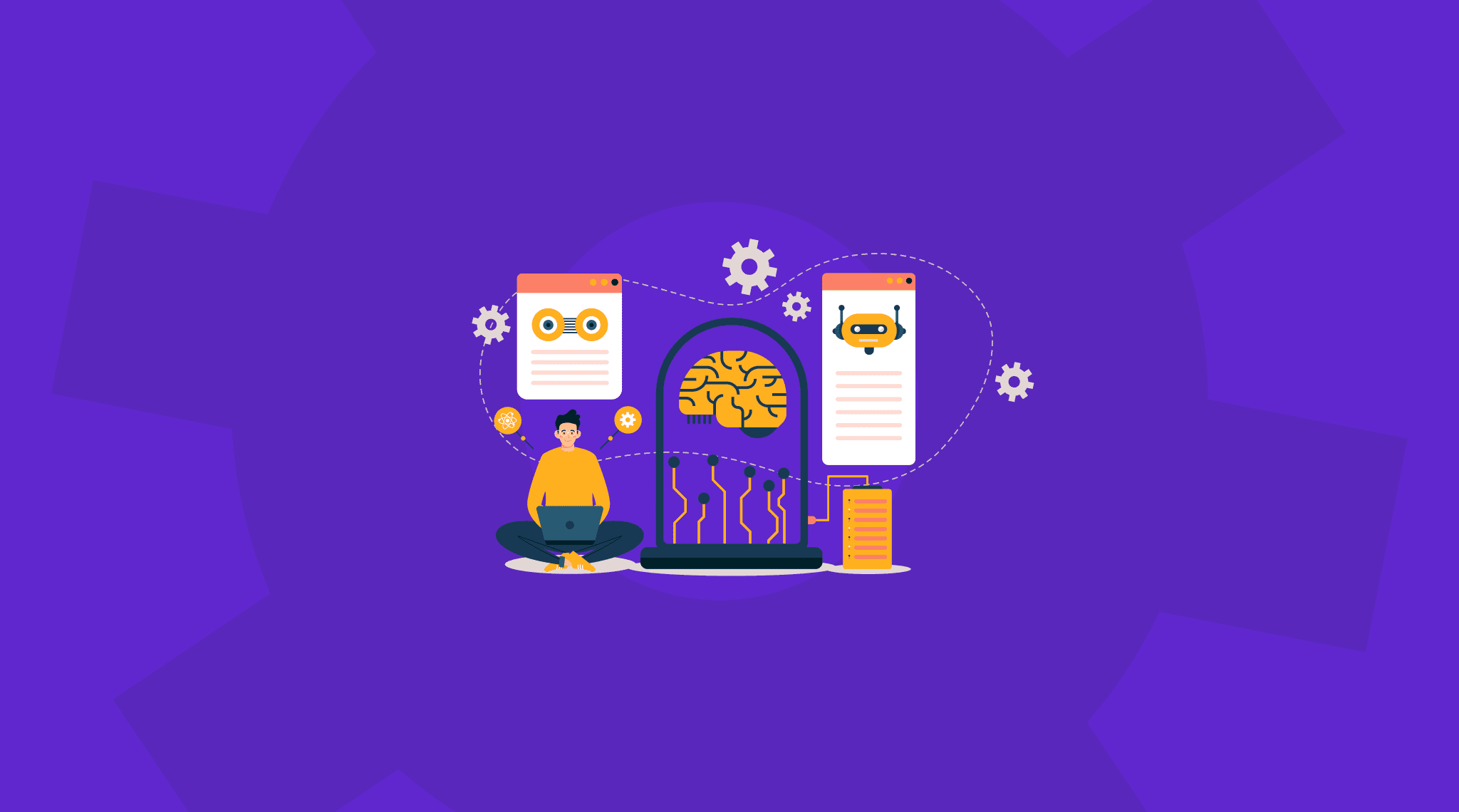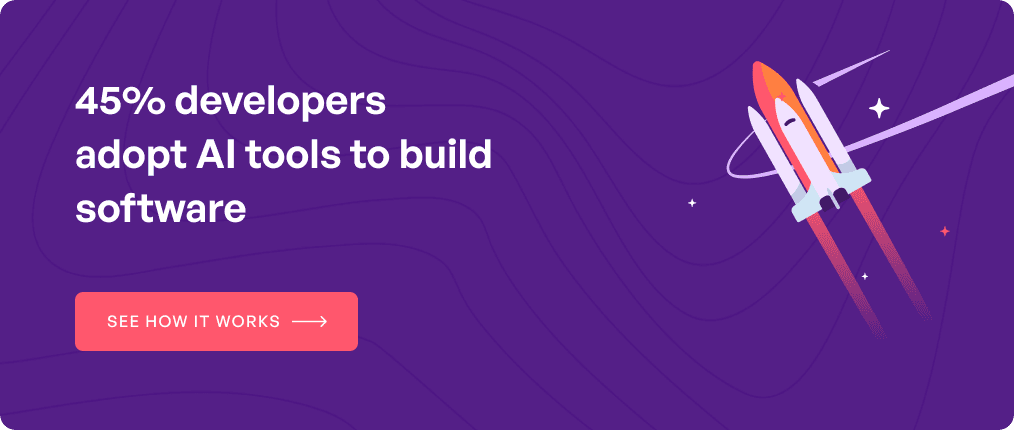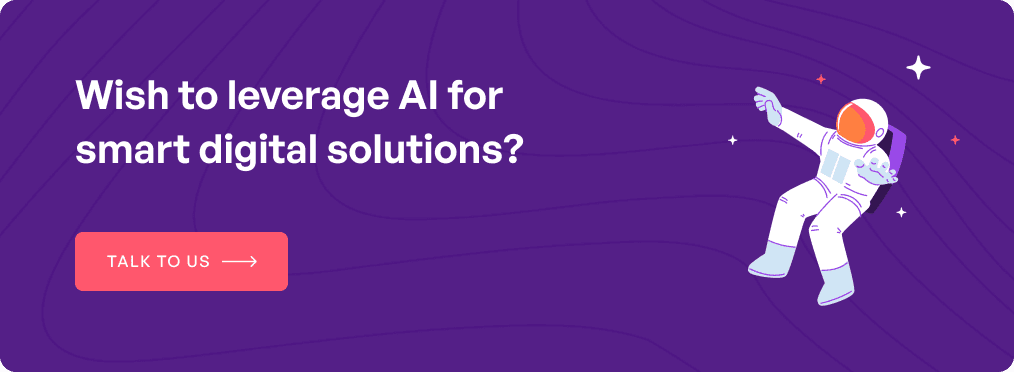AI has skyrocketed in recent years in shaping several aspects of our lives. Industries like healthcare, SaaS and fintech heavily rely on it and there’s no looking back. This is because artificial intelligence has positioned itself as a key driver behind revolutionary technologies like IoT, big data analytics, and robotics. Coming to the role of AI in software development, well, it is phenomenal in transforming existing capabilities and releasing new ones. For instance, AI is used to combine artificial expertise and human skills to generate brand new code snippets and enhance the already running ones to optimize software workflows. These are done with Narrow AI which is typically deployed for software engineering. It helps developers write cleaner codes with the minimum glitches.
Talking about AI, you must know the role of Generative AI, which is a significant branch. Especially with its latest trends, it has blurred the line between reality and fantasy with synthetic identities, deep fakes, and chatbots with emotions. We have seen a steep rise in tools like Gen AI tools like ChatGPT taking the world by storm. In software development, generative AI can build a whole block of new code by considering coding standards, styles and language syntax – something which was unimaginable a decade back. This ultimately leads to more robust and modern software that is both ethically and legally compliant. In the next sections let us learn what is software development and the benefits of using AI in the software development process.
Table of contents
What is software development in simple terms?
This is the process of ideating, designing, coding, testing, deploying, and maintaining applications and computer programs. These stages are altogether called the software development lifecycle. Multiple SDLC methodologies like Agile, Lean, Scrum, DevOps, Waterfall, Spiral, and Kaban are used in the developing the framework.
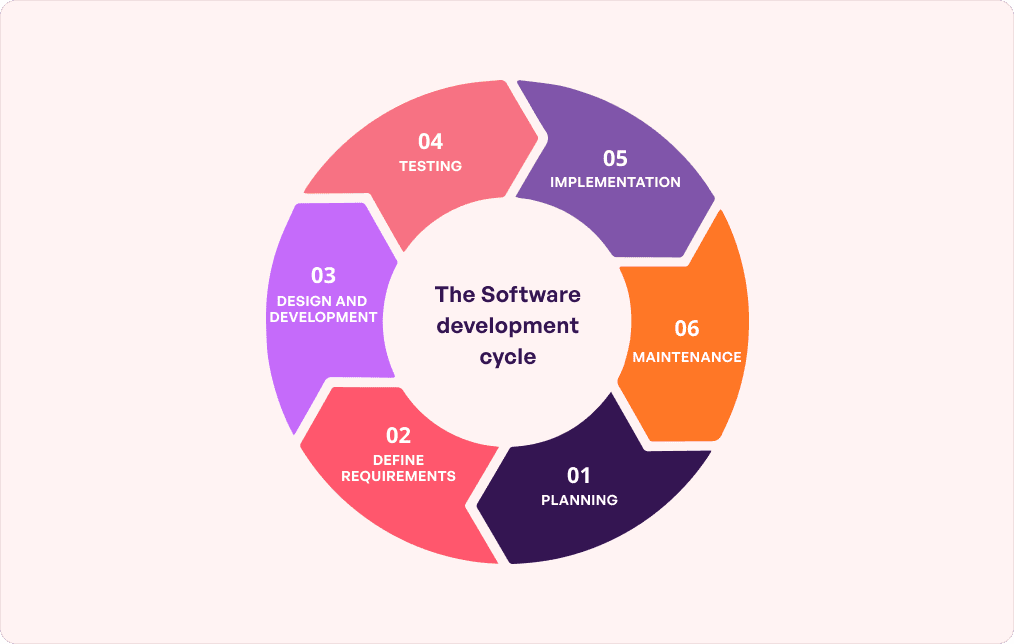 The main ideas behind a structured software development process is to ensure scalability, flexibility, customization, better productivity, high security, reliability, data-driven decisions, and automation – all of these with a cost-effective approach. The persuasive benefits make it a crucial solution to running a business successfully since a tailor-made solution is known to boost ROI and increase the integration possibilities.
The main ideas behind a structured software development process is to ensure scalability, flexibility, customization, better productivity, high security, reliability, data-driven decisions, and automation – all of these with a cost-effective approach. The persuasive benefits make it a crucial solution to running a business successfully since a tailor-made solution is known to boost ROI and increase the integration possibilities.
What are the benefits of using AI in software development?
AI is a curious learner. It is constantly refined by a sea of data which helps unleash unique possibilities in the digital metaverse. No wonder the global AI market is expected to reach $1,345.2 billion by 2030 growing at a whopping 36.8% CAGR from 2023. A part of this propelling growth is due to its powerful benefits in the software development ecosystem. Read on to find out why with a few significant reasons.
- AI can perform tasks that typically require human intelligence and interference. This includes executing multiple stages of software development which can now be automated to save time, money, and energy. It is done by pairing data storage abilities and computational prowess. All that developers have to do is provide specific prompts for the desired outputs.
- While AI helps automate debugging, testing, and code generation by utilizing top-notch practices and learning patterns, software developers can focus more on complex and responsible assignments like strategy planning. This altogether streamlines the development process leading to accurate results, faster time-to-market and finally, stakeholders’ satisfaction.
- AI removes human errors to boost precision and consistency in test automation. Human behavior is also imitated at times to get an idea of the potential flaws. This is something which is beyond the abilities of the time-consuming traditional testing methods like unit or performance testing.
- One of the top benefits of using AI in software development is its ability to predict a system overload. This predictive ability helps in preventing long response times and keeping developers from managing resources effectively. These are quite difficult to detect by humans and thus AI plays a substantial role in the process.
- AI can make fantastic recommendations regarding code enhancement, security measures, and features addition and upgrades. This is done by wading through massive data that is related to software development. So, developers prefer embedding AI into an existing solution-in-process to reduce labor.
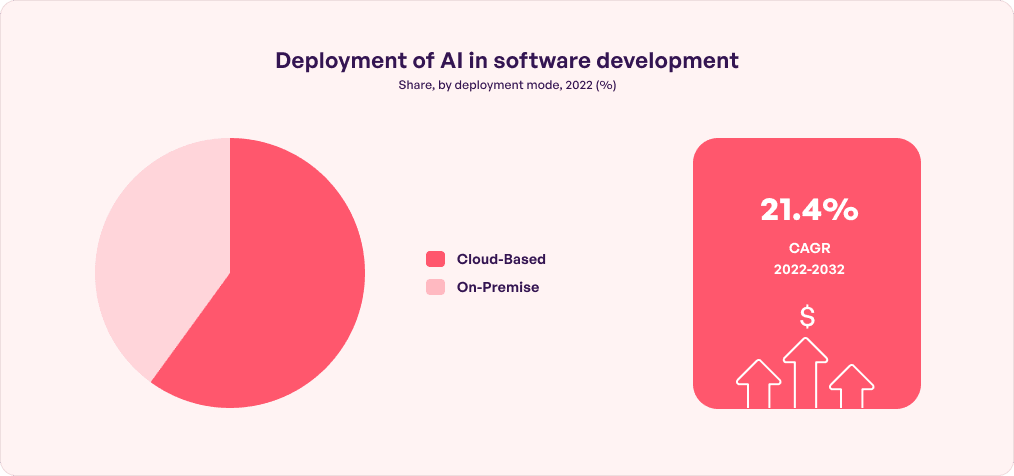 AI for application development is a blend of machine learning, different AI techniques, and natural language processing (NLP). This helps systems to reason, understand, and ultimately process highly complex requirements like bug fixing, code error detection and forecasting customer demands. In the next sections, this article tells you the detailed role of artificial intelligence in software development.
AI for application development is a blend of machine learning, different AI techniques, and natural language processing (NLP). This helps systems to reason, understand, and ultimately process highly complex requirements like bug fixing, code error detection and forecasting customer demands. In the next sections, this article tells you the detailed role of artificial intelligence in software development.
AI in software development : how does it help?
The rapid progress of AI, combined with ML, is why it has been integrated in different stages of the software development process. This means, it has rightly combined human and machine ‘thinking’ to perform tasks efficiently and without supervision.
Along with these, AI also assists in plenty of day-to-day activities like analyzing and feedback management in the software development landscape. Further, emerging trends like explainable AI, edge computing, AI chips, Blockchain, and surge in low-code/ no-code will further polish the possibilities of artificial intelligence.
Below are the game changing intersections of AI and software development.
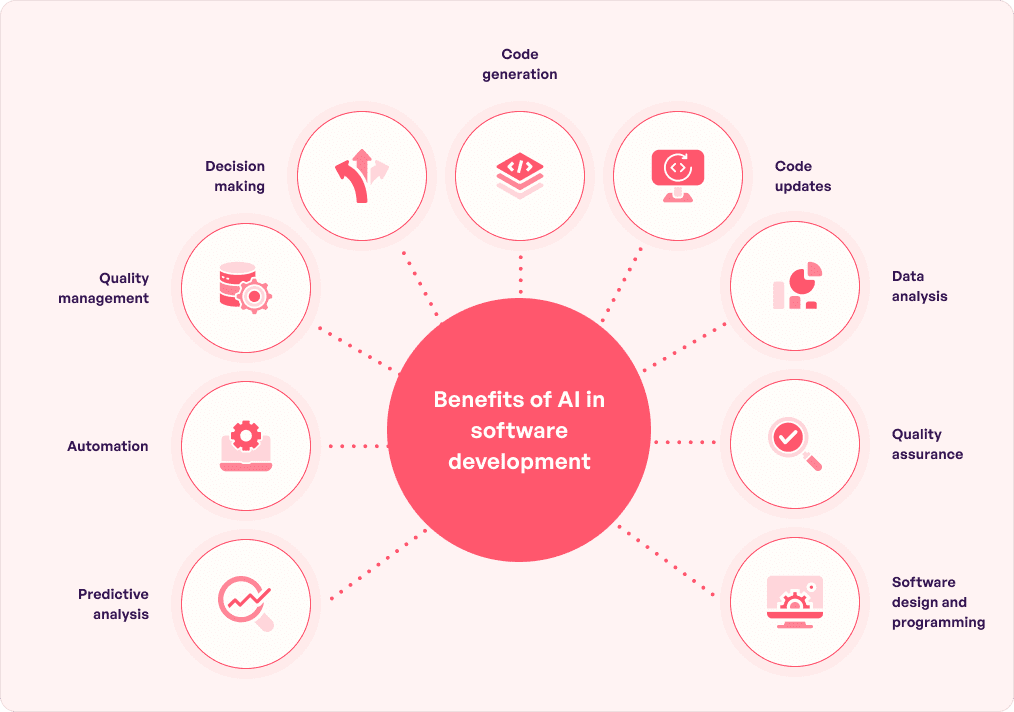
Predictive analysis
Code behavior can be readily anticipated based on trends and patterns. This is made possible by implementing advanced techniques like :
- computer vision
- NLP
- reinforcement learning
- deep learning
These processes aid in amplifying data analysis and predicting future events. Different data-driven insights and factors like seasonality and economic conditions are also taken into account. Further, AI can prioritize developmental tasks. This helps to optimize software functionality and lower the issues around predictive analytics.
However, the role of developers cannot be overlooked. They will have to train the AI solution to make it extremely reliable and resilient which fosters independent functioning. However, there are challenges of using AI in software development in the sense that it might be unreliable at times. The good news is that it can be fixed well which we will discuss in the later sections.
Automation
AI and machine learning automation has enhanced operational efficiency by approximately 40% across multiple sectors. The software development industry is no exception. Developers can harness the power of AI-based algorithms to automate tasks. This includes error detection, data analysis, data cleaning, code review, testing, debugging a code in all stages of development, data entry, and designing, developing, and delivering a software.
The end result of using artificial intelligence in software engineering automation is efficient decision-making and high-end overall performance. Automation is also a catalyst for cost reduction, bug fix suggestions, timely completing deadlines, scalability, and enabling the developers to get involved in other innovative and creative tasks.
At Simublade, AI engineers work to identify efforts that can be automated and then build an intelligent infrastructure to ensure secure and error-proof tasks.
Quality management
Developers can extensively train AI algorithms in checklists to detect suspicious actions. The good news is that these checklists and guidelines have to be built just once. Now, every new software can be trained and created around it. However, customizations in the later stage can be made as per the unique requirements. Using generative AI in software development, especially, can boost productivity and speed by 20-50% which ultimately helps in improving product quality and customer satisfaction.
Decision making
AI can use machine learning algorithms to power decisions. In fact, a global study by Oracle found that 70% of business leaders would prefer an AI robot to make decisions. This translates to the software industry as well. Developers can train AI to make complex decisions based on predefined patterns, variables, and data. In the future, we might get to see AI making autonomous decisions on a large scale.
Code generation
In the past, codes were manually written for defined software requirements. Fast forward to today, using AI in software development can ensure the same, based on inputs of specific parameters. It means, technology, especially generative AI in software development, is reducing the bulk and routine tasks. AI can draft the very first code to kickstart the flow state. This is done with the help of conversational prompts of scanning, monitoring, testing, and feedback loops to ease the developers’ workflow.
The top benefits of using AI for code generation includes
- quicker development
- higher productivity
- offloading developers’ responsibilities.
Further, pricing, compliance, scalability, and security are positively impacted.
Software developers, however, have to eyeball the process and perform the required edits for the most intelligent and logical results. For example, Gemini Code Assist provides code generation and completion abilities. Yet Google is still pushing the system to become a completely virtual assistant without errors.
Code updates
Tasks like little code upgrades, refreshes, and migration can be outsourced to AI. It can also enrich the existing documentation and clean up codes to establish high speed. In addition, the technology is able to run error scans to pick system vulnerabilities. Pre-written programs can be improved by eliminating the identified bugs.
All of these are done by taking user feedback into consideration which is one of the most pivotal roles of AI in software development. It helps developers produce brand new and highly efficient codes faster than usual. However, can AI replace the coders? The short answer is, no. Programming will be a collaborative effort of humans and AI rather than a playoff of who is better.
Data analysis
This is the practice of data analysts to use AI to scrutinize big datasets, discover new trends, and find hidden insights. This helps to transform raw data into real-time knowledge. It is also a fantastic way to find patterns and anomalies for a comprehensive understanding of the development process. Both real-time and historical data is analyzed by algorithms to build forecasting models or create development-related graphs.
Further, other usages of AI in data analytics include explaining the analysis and insights, and creating reports and dashboards. Synthetic data creation is another benefit of data analysis. The true potential of this artificial data is confirmed by a Gartner report that says that synthetic data will fully substitute real data in artificial intelligence models by 2030.
Quality assurance
AI assists the QA engineers in the testing phase. Here’s how. The AI-driven testing process helps enhance the accuracy and efficiency of software development lifecycle with better tracking and a wider test coverage. It can also analyze requirements, historical data, and user stories while covering multiple potential issues to build comprehensive test cases.
Another key role of AI for software development includes bug reports that are created by pulling necessary information like problem descriptions and expected outputs from the data collected during development video records. This ensures that the fixing process can be performed without hiccups. All of these ensure the QA team is focusing on more critical areas to stop the obstacles before they escalate.
Software design and programming
Studies have found that 50% of organizations plan to increase their AI and ML spending for future software development. But why is it so? Well, AI-powered tools and techniques can prioritize test coverage, analyze test results, and spot potential weaknesses in programming. A few AI tools can further detect errors ahead of time depending on the database content which is a phenomenal step in the future of AI in software development.
They can also help develop software in the same language that we use in human conversations.This is made possible by translating natural language into programming languages that systems are fully aware of. So, developers simply have to think about a software in their head and the technology will turn it into a code. The increase in productivity that this process brings is certainly surprising and fun at the same time.
At Simublade, we work together with AI to offer revolutionary software development services. Our software engineers present innovation-first custom applications with smart and customer-first experiences with artificial intelligence capabilities. Learn about how our fruitful collaboration and expertise help offer successful AI app development services.
The challenges of AI in software development
The pros of artificial intelligence are endless. No wonder every industry uses 20% of each AI function since they have fully realized its transformative role. Here’s a look at the reason behind its widespread adoption, especially in software development :
- performs mundane tasks with consistency
- streamlines the coding process to its entirety
- detects both simple and complex bugs
- personalized advanced user experience
- foresees and reduces errors to a great extent
- offers around-the-clock availability
- enables faster yet more accurate decisions than humans
As bright as these sound, there are a few downsides to AI. This means, like any other technology, artificial intelligence has its set of cons. For instance, there are technical challenges which it has not been able to overcome yet. AI ends up presenting results confidently in a way that even the incorrect ones look correct. This is called AI hallucination where the AI generates misleading results. This is a significant barrier in productivity and quality when it is about software development. However, the good news is that it can be tackled. Since the predictions are not 100% true, experienced software developers intervene to make it a useful tool.
Can AI replace humans in software development?
No, AI is not yet in the position to replace programmers. Although it might be able to in a few years down the line, yet it cannot be widely adopted. This is because the core of programming is ‘thinking’ to ensure logical solutions. Further, human developers offer a level of comfort that resonates with companies and the society as a whole.
Further, the essence of creating software is not just coding, it also encapsulates defining problems, troubleshooting, creativity and communication – skills that are solely human and AI is yet to master them. So, despite the large-scale usage of AI applications in software development, the contribution of high-value flesh-and-blood individuals is indispensable.
AI lacks the ability to innovate and understand. Further, technology itself requires inputs from software developers, machine learning engineers, and data scientists to function. So, the workload might shift but AI is less likely to overpower humans. Instead, it will grow hand-in-hand with us to complement different procedures and even discover potentials that stand impossible at the moment.
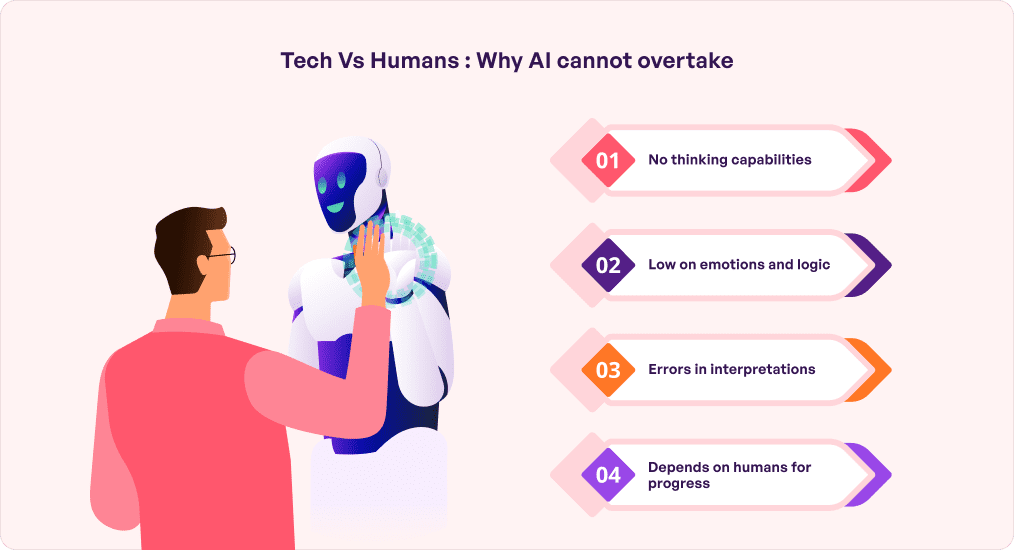 For instance, solving problems with LLMs in 3 mins which otherwise might have taken 3 months for engineers.
For instance, solving problems with LLMs in 3 mins which otherwise might have taken 3 months for engineers.
AI and software development : the ethical and legal considerations
There are specific ethical and legal considerations of AI in the software development process. Here’s a comprehensive understanding to ensure strong business ethics while never inviting legal complications.
Ethical considerations include accountability, fairness, privacy, and transparency. This means, developers must design the AI system in a way that the results are equal for all users across race, gender, ethnicity, and status. Further, audits and rectifications must be allowed freely from user feedback to help take accountability. Lastly, all sensitive third-party data collected, stored, and processed during the software development process must be handled with caution to avoid data breach and leaks.
As far as the legal implications of the role of AI in software development, developers must train the AI algorithms in a way that they are in sync with the privacy laws. Else, the software developers could invite public litigation, reputation damage, and hefty fines. So, they must take care of intellectual property complexities, confidentiality concerns, and tort liabilities.
For this, it is necessary to understand :
GDPR (general data protection regulation)
This law guides AI usage and requires careful handling and protection of personal information. This enables lower risks of cyber threats. Further, GDPR also requires AI mechanisms to prevent collection and manipulation of non-essential user data.
EU Artificial Intelligence Act
Cyber attacks loom large in the software development industry. So, developers must adhere to this standalone law which has robust risk categorization like unacceptable risks, high risks, limited risks, and menial risks. There are precise boundaries for each one like prohibited practices for exploiting vulnerabilities and established practices like conducting appropriate testing before an AI product is released for public use.
Future of AI in software development
As we discussed earlier, AI will not replace software developers. However, it will continue to transform the programming landscape with automation to improve competency and productivity. The relationship between AI and software development is likely to be polished in future since artificial intelligence will maintain, write, and analyze programs.
They will also help with data preparation, data collection, model deployment, and model management. Developers, on the other hand, will source and compose large datasets to further train the AI algorithms to generate smart results.
Simublade’s trusted generative AI development services aim to elevate automation and productivity and thus ensure operational excellence. Connect with us to know how our software developers leverage well-strategized AI, deploy intelligence-powered products and advanced techniques and algorithms for your software development.
FAQs
Q. How can AI help with software development?
Ans. The role of AI in software development includes data analysis, data processing, code generation, quality assurance, automation, feedback management, prediction and inference, and decision making.
Q. What is the role of AI in the SDLC?
Ans. The role of artificial intelligence in software development life cycle includes optimizing workflow, detecting and fixing errors, automating tasks, and enhancing the overall quality of the software development stages. So, including AI in SDLC methodologies frees developers and lets them focus on other innovative tasks.
Q. How does Gen AI affect software development?
Ans. Generative AI in software development helps with automatic feature generation, faster test cases, data synthesis, granular troubleshooting, wireframes and test scripts, and quick and consistent solutions.
Q. How will AI be a challenge in software development?
Ans. Using AI in software development can sometimes mean inaccurate results. This is known as AI hallucination. However, our AI engineers’ team at Simublade is an expert in reviewing and editing the final code to avoid discrepancies and ensure accuracy. Further, AI also lacks the creative and critical thinking abilities. This gap can also be filled by human developers to keep the big picture and client expectations aligned.


